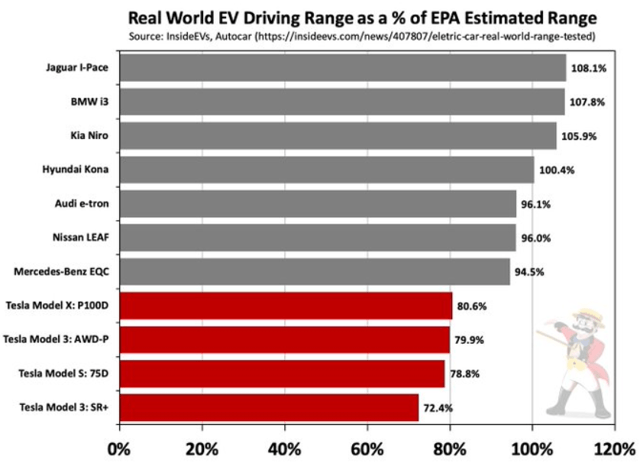One of the critical myths that many hold to be true is that Tesla has a serious advantage in battery mileage.
This write-up looks at Tesla’s reported battery performance results versus performance in real world driving tests, and versus its results in the tests supervised by the Environmental Protection Agency (“EPA”). Tesla’s relative performance is compared to the relative performance of other manufacturers. Some of the tests and reported results look at the fully-charged range and others address issues of efficiency. Some of the tests and reported results are done under highly controlled conditions, whereas others are less rigorous.
The following tables summarize the results from all the comparative tests under controlled circumstances that the author was able to find:


Comments
- Note that there is not a single test where any other brand did comparatively worse than
any Tesla. - Multiple tests and multiple forms of tests all show the same results: Tesla
underperforms its EPA ratings materially, consistently and uniquely. - Tesla has responded to the Autocar/What Car? results by claiming that the failure to
fully drain the battery invalidates the test. But multiple other tests that show full
draining produce the same results. - Highway results are likely to be most relevant since this is the type of driving where
range is most important.
Additional evidence: The EPA test versus the WLTP test
- The EPA test is the standard in America. Elsewhere, the World Harmonized Light Vehicle
Test Procedure (“WLTP”) is used. Both are government-authorized and highly controlled
tests. The WLTP test consistently produces longer range results than the EPA test. - An analysis of all 10 vehicles (including 3 Tesla’s and 7 other brands) for which the author
was able to find comparable results shows that the average ratio of the ranges
produced by the tests (EPA/WLTP) is 83% for the Tesla’s versus 93% for the other brands.
However, unlike the controlled, comparative tests reported above, there is greater
variance of the results and some non-Tesla brands have results lower than some Tesla’s. - Since it is difficult to “game” two very different tests at the same time, this is evidence
that Tesla is looking to optimize results on the EPA test.
Three professional testers/automotive writers (Edmunds, The Drive, Road & Track) have all commented on this subject. These authorities all come to the conclusion that Tesla materially, consistently and uniquely overstates its range. Here are some representative quotes:
“I’m tired of this. I am not able to match, let alone exceed, the Tesla’s rated range. This flies in
the face of every other EV…. I’m thinking [Tesla’s] ratings are overstated. Of course they are.” (Edmunds)
“But Tesla’s numbers have never really made sense to me either. These are great cars, but I can tell you that there’s no universe in which a Tesla can approach its EPA ratings in real-world driving.” (The Drive)
“It seems Tesla optimizes its cars for the EPA test, which gives them range numbers to brag about on paper—numbers that owners I’ve spoken with can’t seem to reach.” (Road & Track)
Spritmonitor.de is a German website where car owners can input their actual consumption results for both EVs and ICE vehicles. This is obviously not a controlled result. However, if Tesla’s had materially more efficient EV Drivetrains, you would expect to see a systematic difference between Tesla’s and other brands in the website’s measure of efficiency (average kWh consumed per 100km of driving). Adjusted for the weight of the vehicles, which is admittedly a very crude standard, there appears to be no material difference.
Tesla’s contain a GPS feature that directs that driver to the nearest Supercharging station. The feature also shows whether the driver has sufficiently battery charge to make it to the station. To make this calculation, Tesla uses data crowd-sourced from Tesla cars. The results imply battery ranges much closer to the shorter real-world results than the EPA results. This belies the claim from many Tesla bulls that the other tests are biased against Tesla.
Conclusions
In the real world, Tesla’s do not have a material technological advantage in the company’s EV Drivetrains. Although Tesla’s range and efficiency results are as good as, but not materially better than, other manufacturers, this “advantage” needs to be tempered with the following considerations:
- There are clear indications that Tesla uses technologies, such as battery chemistries and
configurations, which are inherently less safe than those used by other manufacturers
but which produce higher power densities. Other manufacturers are not willing to make
this trade-off versus safety. - There are also clear indications that Tesla uses technologies that are less reliable and
durable than those used by other manufacturers. The range of Teslas seems to decline
faster than other brands with use, Teslas very quickly go into “limp” mode to avoid
overheating (like in the quarter-mile races in this test), and Teslas quickly reduce
charging speeds. All of these are indications of EV Drivetrains optimized for short-term
“bragging” results rather than long-term performance and customer satisfaction. - It has to be remembered that Tesla’s are designed from the ground up to be EVs,
whereas most of its competitors to date are general models that have an EV Drivetrain
option. The ground-up designs should be more efficient. Tesla’s more recent
competitors, which are not included in these test results, are starting to be ground-up
designs and therefore should perform relatively even better.
As is so often the case with Tesla, a seeming technological advantage is just Tesla’s willingness
to be more reckless and short-sighted than other companies.
It is clear that Tesla is “gaming” the EPA test. Although this is probably done to a degree by all manufacturers, it is clear that Tesla is doing this far more aggressively than other manufacturers. This is another case where Tesla is not better, merely more reckless.

